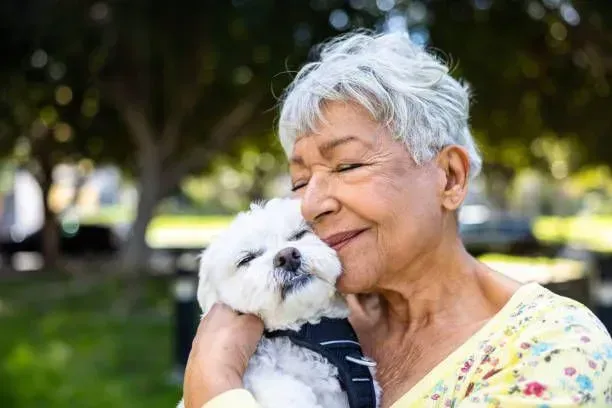The Health Benefits of Pets for Seniors
The Health Benefits of Pets for Seniors
Pets offer numerous health benefits for seniors, significantly enhancing their physical, emotional, and social well-being. The companionship of a pet can alleviate feelings of loneliness and depression, providing a consistent source of affection and interaction. This emotional bond can lead to reduced stress levels and a greater sense of purpose and fulfillment. Physically, caring for a pet encourages seniors to engage in regular activities such as walking and playing, which can improve cardiovascular health, mobility, and overall fitness. Moreover, pets can help lower blood pressure and cholesterol levels due to the calming effects of their presence. Socially, pets often become conversation starters, helping seniors connect with others and fostering a sense of community. This can be particularly beneficial in reducing social isolation, which is a common issue among elderly individuals. Overall, pets contribute to a more active, engaged, and emotionally satisfying life for seniors, promoting better mental and physical health.

Pets for the Elderly can Boost Overall Well-Being
The Mayo Clinic reports "pets play a huge role in creating a healthy lifestyle. In fact, studies have shown that pet ownership can enhance fitness levels, lower blood pressure and cholesterol levels, relieve stress, improve mental and heart health, and boost overall happiness and well-being."
As we age, maintaining good health and overall well-being becomes increasingly important. While there are various ways to achieve this, one often overlooked method is by having a furry companion. Pets, especially dogs and cats, have proven to provide numerous physical, mental, and emotional health benefits for seniors. At 7 Day Home Care, a trusted provider of home care services in Manhattan, Brooklyn, Queens, Nassau County, and Suffolk County, we recognize the tremendous impact that pets can have on the lives of seniors. In this article, we explore the compelling statistics and evidence that highlight the health benefits of pets for older adults.
Pets can Reduce Stress and Anxiety
Pets have been found to significantly reduce stress levels and alleviate anxiety in seniors. According to a study conducted by the National Center for Biotechnology Information (NCBI), spending just 15 minutes with a dog can lower cortisol, the stress hormone, in older adults. This reduction in stress can lead to improved cardiovascular health and a decreased risk of heart disease. Additionally, the same interaction with pets can stimulate the production of serotonin and dopamine, neurotransmitters that promote feelings of well-being and happiness. Regular pet companionship also contributes to lowering blood pressure and enhancing immune system function. Moreover, the routine of caring for a pet, including feeding, grooming, and exercise, provides structure and purpose, which can help combat feelings of depression and anxiety. Engaging with pets can also enhance cognitive function by encouraging mental alertness and memory retention through activities such as remembering feeding times or training commands. Overall, the emotional, physical, and mental health benefits of pet ownership make it an invaluable aspect of promoting well-being in seniors.
Pets can Enhance Physical Activity for Seniors
Seniors who own pets tend to lead more active lifestyles. Walking a dog or playing with a cat provides opportunities for exercise, which can contribute to improved physical health. A study published in the Journal of Aging and Physical Activity found that older adults who regularly walked their dogs had lower body mass index (BMI) and were more likely to achieve recommended levels of physical activity. This regular exercise helps maintain muscle strength, flexibility, and balance, which are crucial for preventing falls and maintaining mobility in seniors. Furthermore, engaging in physical activity with pets can improve cardiovascular health, enhancing endurance and reducing the risk of conditions such as hypertension and stroke. Beyond physical benefits, pet-related activities offer social interaction opportunities, such as meeting other pet owners during walks, which can reduce feelings of isolation and improve overall mental well-being. Additionally, the playful nature of pets can inject fun and laughter into daily routines, further promoting a positive outlook and emotional health in seniors.
Lowering Blood Pressure for Elderly with Pets
Studies have shown that interacting with pets can help lower blood pressure. A research study conducted at the State University of New York at Buffalo found that hypertensive patients experienced a significant reduction in blood pressure during periods of pet interaction. This suggests that pets may play a role in managing hypertension, a common health concern for seniors. The presence of a pet can induce a calming effect, reducing anxiety and stress levels, which are significant contributors to high blood pressure. Furthermore, the tactile experience of petting an animal can trigger the body's relaxation response, releasing endorphins that counteract stress hormones. The regular routine of pet care, including feeding, walking, and playing, encourages physical activity and can lead to long-term cardiovascular benefits. Additionally, pets provide emotional support and companionship, which can combat loneliness and depression, further contributing to cardiovascular health. Social interaction with pets can also promote a sense of security and comfort, helping to stabilize blood pressure levels. Overall, the multifaceted interactions with pets create a supportive environment that can significantly aid in the management of hypertension among seniors.
Pets Can Help Relieve Loneliness and Isolation for Elderly
Loneliness and social isolation are prevalent among older adults, and they can have adverse effects on physical and mental health. Owning a pet provides companionship and reduces feelings of loneliness. According to a survey conducted by AARP, 75% of older adults reported feeling less lonely due to owning a pet. Pets offer a consistent presence that can alleviate the emotional pain of social isolation by providing unconditional love and companionship. This connection can be particularly vital for seniors who may have lost a spouse or live far from family. Interacting with pets can also release oxytocin, the "bonding hormone," which enhances mood and fosters a sense of well-being. Furthermore, pets can encourage seniors to engage in social activities, such as visiting parks or attending pet-related community events, which can help expand their social networks and improve their overall social engagement. The routine and responsibility of pet care can give seniors a sense of purpose and daily structure, which are crucial for maintaining mental health and cognitive function. By mitigating the effects of loneliness and isolation, pets play a vital role in enhancing the overall quality of life for older adults, contributing to both their emotional resilience and physical health.
Boosting Mental Health for the Elderly with Pets
Pets have a positive impact on mental health and emotional well-being. A study published in Aging & Mental Health found that seniors who owned pets had lower rates of depression compared to those without pets. Additionally, interacting with pets stimulates the release of endorphins, the "feel-good" hormones, which can enhance mood and reduce symptoms of anxiety and depression. Pets provide a sense of routine and purpose, which can be particularly beneficial for seniors struggling with feelings of hopelessness or inactivity. The act of caring for a pet, such as feeding, grooming, and playing, can create a sense of accomplishment and daily achievement. This interaction also helps in maintaining cognitive function by keeping the mind engaged and active. Furthermore, pets can serve as a comforting presence during stressful times, offering emotional support that can help seniors cope with grief, loss, or significant life changes. The physical affection and unconditional love from pets can foster a sense of security and belonging, counteracting feelings of isolation. In addition to these emotional benefits, the companionship of pets can also encourage social interaction with other pet owners and community members, thereby enhancing social well-being and further reducing feelings of loneliness and depression. Overall, the presence of pets contributes significantly to the emotional resilience and mental health of seniors, promoting a happier and more balanced life.
Pets can be invaluable companions for seniors, offering numerous health benefits that contribute to an improved quality of life. From reducing stress and anxiety to enhancing physical activity, lowering blood pressure, and alleviating feelings of loneliness and isolation, pets play a significant role in promoting overall well-being. At 7 Day Home Care, we understand the importance of providing holistic care to our clients, and we recognize the incredible therapeutic value that pets bring.
If you or your loved one are seeking compassionate and affordable home care services in Manhattan, Brooklyn, Queens, Nassau County, or Suffolk County, contact 7 Day Home Care today at 516-408-0034. From the Upper East Side, Upper West Side, and SoHo to Tribeca in Manhattan, and Forest Hills, Whitestone, Malba, Bayside, Douglaston, Beechhurst to Belle Harbor in Queens, and Cobble Hill, Carroll Gardens, Boerum Hill, Fort Greene, DUMBO, Park Slope, Red Hook to Prospect Heights in Brooklyn, New York, 7 Day Home Care stands ready to provide our outstanding person-centered home care services today.
Brian Callahan
7 Day Home Care










